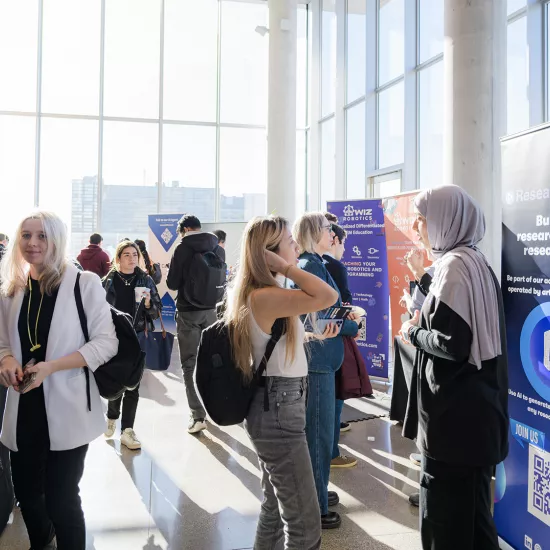UTM establishes Ontario’s first endowed chair in Sikh studies, propelling study of Sikhism at U of T

Last updated: Oct. 10, 2024, 5:30 p.m.
The University of Toronto Mississauga is establishing an endowed chair in Sikh studies, representing a major step forward in research, education and community collaboration focused on Canada’s fastest-growing religion.
With $2.5 million from Dr. Davindra Singh, matched by the university for a total of $5 million, the endowment will build on the recent momentum in Sikh studies, promoting new research and advancing knowledge and outreach initiatives, including engagement with the Sikh community locally and globally.
The endowed chair, currently the only one of its kind in Canada, can attract and retain internationally recognized scholars, leading to new research collaborations and building an unmatched program that will train future generations of students and researchers who, in turn, will go on to become academic stars.
“This investment reflects our commitment to fostering a deeper understanding of Sikh culture and heritage within and beyond our university community,” says Alexandra Gillespie, U of T vice-president and UTM principal. “Through innovative research and impactful community engagement, we will inspire new generations of students and scholars to explore this vital field of study.”
Singh, a former chair of the Sikh Foundation of Canada, says his community has wanted to establish a chair in Sikh studies for decades. “I’ve always believed in giving back to society in whatever way you can, and this may vary depending on one's stage in life. In my earlier years, I volunteered my time but always desired to become more involved in philanthropy in my retirement years. When this opportunity to partner with a world-class university arose, I felt the need to support this financially, even though retirement is not yet on the horizon.
“Students from many faiths and backgrounds want to learn about Sikhism,” he says. “Canada has the largest Sikh diaspora in the world, with about 800,000 living here, and nearly 14 per cent are based in Peel region. It makes sense to offer programs of study that reflect the surrounding community.”
Singh is the founder and lead dermatologist at AvantDerm in Toronto, home to the country’s first ethnic dermatology clinic and rapid access clinic. He is most passionate about solving the acute care dermatology crisis the country is currently experiencing. He completed his dermatology residency at U of T after beginning his career as a family and emergency physician in Northern Ontario. He maintains his academic appointments at U of T and Northern Ontario School of Medicine.
“Education is extremely important to me and my family,” says Singh, noting that when his father arrived in Ontario in 1956, he was among the first Sikhs in the province. “One of the definitions of Sikh is ‘learner,’ and our Gurus were huge proponents of education. Sikhs believe that learning about different religions, cultures and languages is essential to understanding and communicating effectively with others in society.”

The teachings of Guru Nanak (b. 1469) gave rise to Sikhism in India’s Punjab region. There are about 27 million Sikhs globally, making it the fifth largest religion. The first Sikhs came to Canada at the turn of the 20th century, and today Punjabi is the third official language of Canada’s Parliament, after English and French.
The endowed fund made possible by Singh's gift will enable UTM to establish the chair in Sikh studies while also supporting knowledge translation and engagement with the local, national and international Sikh communities.
The endowed chair is a university-wide initiative, with undergraduate studies at UTM and graduate studies on the St. George campus. UTM has committed to a repository of Sikh literature within its library.
“Not only does UTM have a growing number of Sikh students, but Sikhs play a vital role in the cultural, political and social life of Peel region and Canada,” says Ajay Rao, UTM’s vice-dean of graduate studies and postdoctoral affairs and associate professor in the department of historical studies. “This chair will attract a leading scholar who will work closely with communities near the university and beyond. Instead of approaching Sikhism as an archaic topic, students will see it as a lived religion in their own environment.” Community collaborations could include public lectures, internships, student visits to gurdwaras and projects with UTM’s Sikh Student Association.
“We extend our gratitude to Dr. Davindra Singh for his commitment to broadening academic discourse on Sikhism,” says David Palmer, U of T’s vice-president, advancement. “His extraordinary gift will serve as a beacon for other philanthropists who want to help elevate an academic field to new heights. Dr. Singh’s generosity embodies the spirit of Defy Gravity: The Campaign for the University of Toronto, which is fuelling U of T’s mission as one of the world’s largest engines of social mobility and progress.”
Singh is committed to sharing his time, lived experience and connections in Ontario’s Sikh community with the incoming chair holder and future Sikh studies students. His long-term hope is that this will be the first of many such chairs. “I’d like to see it serve as a source of inspiration and motivation to other universities across Canada, the U.S., and globally.”



